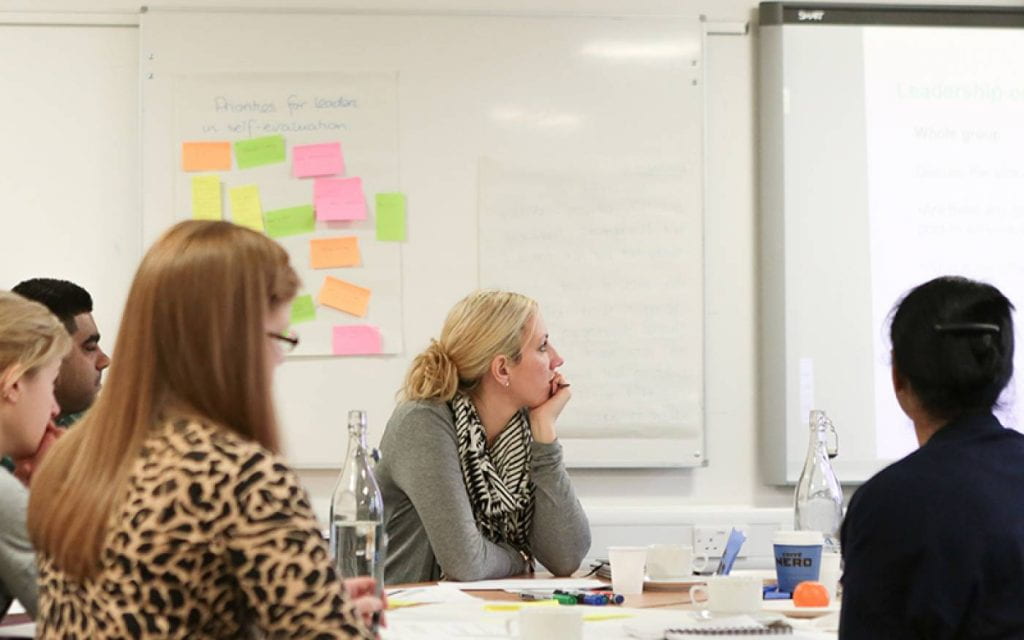The right support at the right time for new teachers
By Blog Editor, IOE Digital, on 26 March 2021

Photo: Jason Ilagan for UCL Institute of Education
26 March 2021
By Hilary Adli, Qing Gu, Mark Quinn, UCL Centre for Educational Leadership
Two years ago, when the Department for Education published their Teacher Recruitment and Retention Strategy, this ‘unflinching’ look into the problems faced by the teaching profession was dedicated to ensuring that ‘a career in teaching continues to be attractive, sustainable and rewarding.’ However, it couldn’t have anticipated a future pandemic and the requirement to teach remotely as among the problems faced by the profession. One particular sector of the school workforce – those in initial teacher education (ITE) – faced particular challenges after the first lockdown was announced in March last year. Unable to physically attend their placement schools, ITE students had to rapidly make themselves useful to their colleagues, doing their best to support learning from home.
Fortunately, the Department’s strategy to retain teachers included the Early Career Framework (ECF) reforms. The UCL Early Career Teacher Consortium had been selected as one of four providers of an early roll out of ECF-based professional development in the north of the country which launched in September 2020. Our programme has had to be agile enough to support the needs of new teachers whose ITE was so radically disrupted. We responded to three categories of need.
Front-of-class experience, and getting feedback on teaching
The first two modules of our programme on enabling and engaging pupils in learning took place in the autumn term, when schools were open but subject to Covid safety measures. The sequence and contents of our programme were not created in response to the pandemic, but because they are grounded in what research says about how teachers learn and grow over time, the knowledge, skills and pedagogical approaches that we embedded in the first two modules resonated especially well with our early career teachers (ECTs) this year. The first seven weeks of our programme addressed Teacher Standards 1 (set high expectations) and 7 (manage behaviour effectively) – which are of prime concern for an ECT. Collaborating with their mentor, they had some observation and feedback on topics such as: Understanding teachers as role models; Establishing the learning environment and Supporting vulnerable pupils; Understanding pupils as learners; Managing behaviour.
Mentoring
Mentoring did continue while trainees were on placement. New teachers have long had an entitlement to a mentor in their induction year; this principle is embedded into the core of the ECF. Our programme has structured weekly mentoring based upon the research of the framework – more frequent and more productive than many would have normally had. In evaluations, 89% of ECTs have told us that high quality mentor sessions have supported their learning; 91% of mentors rated the quality of our materials as at least good.
Peer networks
The Teacher Tapp blog recently found that, although staffrooms largely remain open, due to COVID-related safety measures they are not currently places colleagues can socialise in or exchange professional advice as they would normally do. Peer networks are opportunities for new teachers to look beyond their own classrooms and look up from their own piles of work. Again, the creation of professional learning communities in our programme was not to serve the challenging conditions caused by the pandemic, but our research-informed approach to supporting ECTs’ professional as well as social needs for learning is paying dividends. Twice every half-term, we bring ECTs virtually together in clusters of 15 for training and an online learning community, led by a facilitator who also looks out for their wellbeing.
This has been an amazingly challenging year to start a career in teaching. The resilience and positivity of ECTs, despite their curtailed ITE experience, has been inspiring: they remain committed to their own development, continuing to turn up for sessions in their peer network and sharing their learning honestly. We have now been chosen to run our programme in the national roll-out of the ECF reforms, which means that we will be supporting ECTs from Newham to Newcastle. After another year where ITE has shown resilience through the pandemic, we are confident we can still help make teaching attractive, sustainable and rewarding.
 Close
Close



